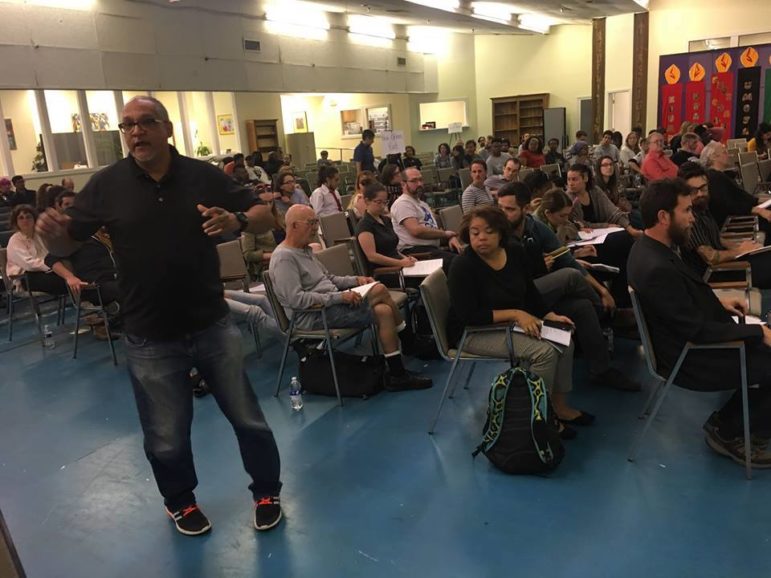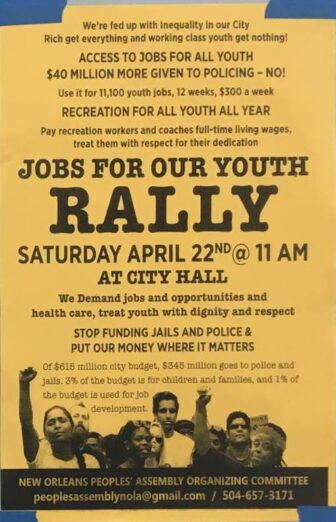
New Orleans is not the best city in the world. New Orleans is not the best city in America. In fact New Orleans is not even the best New Orleans can be.
How to make this city the best it can be is debatable. The New Orleans iteration of a burgeoning international movement called People’s Assembly has a plan to improve the lives of most people in the area. While politicians offer the same pig with different lipstick and promise revolutionary change, the People’s Assembly New Orleans has come up with a new approach.
As Colin Powell has said, “Policies that emanate from ivory towers often have an adverse impact on the people out in the field who are fighting the wars.” Powell should know; he was an army general and head of the Joint Chiefs before serving as Secretary of State.
Whenever I hear talk of parallel universes and alternative realities, I often think of the activists working in and around New Orleans. Operating in plain sight, tirelessly but without fanfare, these dedicated and persistent agents of change slowly build consensus and momentum.
People don’t notice until the huge, fast moving and powerful ball of change splatters them with mud during their casual evening stroll. Like the happily married husband who’s shocked to discover that his wife wants a divorce, conservative or privilege-sheltered whites and African Americans have radically different experiences and perspectives in New Orleans.
Such was the case when Take ‘Em Down Nola claimed victory as the monuments were pulled off their pedestals. But while community organizer Malcom Suber stood before the microphones and talked about “decades of struggle,” few realized what those decades entailed — the hours of planning and strategizing and meeting and cajoling and encouragement and arguing. To the disengaged, a 15-second sound bite provides no insight into the depth and scope of community organizing happening in this city.
Generally, people are disconnected from and disconcerted by the political process. Local elections usually result in around a 10 percent turnout of registered voters. And community organizers often work most closely with the most disconnected among us — non-voters. The job these organizers have chosen to accept is to inspire the least motivated people to participate in the political process. As community leader Angela Kinlaw puts it: “This is what democracy looks like.”
The improper tone and timing of a “hey, baby” can sound condescending to a young black man and leave him feeling disrespected, I warned.
These two community stalwarts, old-school Suber and new-blood Kinlaw have joined forces to create the People’s Assembly New Orleans. People’s Assembly was started in England to fight for groups hit by government policies, including low-paid workers, disabled people, unemployed people, black people, young people, ethnic minorities and women. The local People’s Assembly is inspired by the international movement but not formally affiliated with it, Suber points out.
Currently nearly every modern democracy has an active branch of the People’s Assembly as does every major city in America. A long-time organizer, Suber is widely known as a driving force behind protests advancing a progressive liberal agenda in New Orleans. Kinlaw is an educator, a California native who migrated to New Orleans in 2006.
According to Suber, “The People’s Assembly in New Orleans is our attempt to build a grassroots, working-class organization of, by and for the working people of this city. It is important that we wake what I call the sleeping giant, the black community, to recognize that with our numbers if we were properly organized and understood our power we could control this city. We are trying to expose to the people that the priorities now followed by the rich ruling class and their lackeys are not the priorities that we as working people would pursue if we were in control. So we are asking people to join with us. Let’s take control as we improve our city.”
Together, Suber and Kinlaw lead a strong and diverse coalition of over 350 community activists, many of them leaders of additional activist groups. They meet for educational outreach sessions designed to make them better organizers. Monthly sessions feature entertaining and enlightening speakers on a wide range topics, such as effective communication and struggle. People come and go, but many absorb the entire presentation, some of which have been four hours long.
Planning and steering committees assess the effectiveness of the presentations and measure their usefulness based on questions and answers provided by audience members. The experience builds a living connection among community leaders, one that unifies them and breathes life into their work.
I addressed a recent outreach session that drew more than 200 people to Christian Unity Baptist Church. The People’s Assembly planned to go door-to-door informing everyday New Orleanians of an upcoming protest around the urgent need for more summer jobs for youth. Since the majority of the activists knocking on doors would be white and many of them from other cities, a thorough lesson on the proper use of “’Hey, baby’ or ‘Where y’at?’” was required. The improper tone and timing of a “hey, baby” can sound condescending to a young black man and leave him feeling disrespected, I warned. Even the most well-intentioned organizer risks sharp and immediate rebuff if misunderstood.
My 40-minute presentation may have fallen short of being truly electrifying, but the follow-up brought the house down. Two stars of our activist community, Gavrielle Gemma and Big E, role-played a cold walk-up conversation between a middle-aged white lady from up North, and a young African-American man sitting on his stoop. “Are you busy? Can I talk to you about something important?” Gav asked. The crowd roared when Big E rose up in a perfect simulation of the surprise, disbelief, fear and intimidation that comes over many a man in his ‘hood when an unknown white person dares to come at him so aggressively.
Gav pressed on asking open-ended questions, establishing rapport and successfully recruiting an interested citizen. The next week about one hundred real volunteers canvassed targeted neighborhoods using some of these freshly honed communication skills. Their outreach work culminated in a rally with over 250 newly involved New Orleanians invested in increasing summer employment for our youth.
Near the intersection of Claiborne and Esplanade avenues, The People’s Assembly has a local office with internet access and office furniture — all of it donated. Flyers alert participants to upcoming events. Regular monthly meetings are held around large white tables with a hodgepodge of chairs. After a day walking the beat, members gather for replenishment. Neighborhood people drop by for open houses. The space is used for barbecues, concerts and other events that encourage people to gather and network.
The organization’s agenda is explicit and lengthy. Goals are both inspirational and aspirational:
- Living wage jobs
- Decent and affordable housing
- Removal of white supremacist representations from the city
- Ending all discrimination based on race, gender or sexual orientation
- Free drug and mental rehab centers
- Reliable public transportation
- 24-hour public childcare for working families
- Ouster of DA Leon Cannizzaro
- Opposition to imperialist wars
- Properly taxing the rich
- Ending police terror
- Community-controlled public schools
These goals are the outgrowth of a series of meetings and some are beginning to build momentum.
For years, Suber and Kinlaw have maintained that drug addiction and mental health issues should not be dealt with as criminal matters. In the state legislative session that just ended they backed measures that would treat drug abusers rather than arrest them, a struggle gaining momentum now that lethal and debilitating heroin and opioid abuse has become such a problem in the white community. The 10 criminal justice bills that were enacted by no means fulfilled Suber and Kinlaw’s full agenda, but incremental progress was made on several fronts, including funding for alternatives to prison for minor offenses and lifting the ban on food stamps and welfare for drug offenders following release from prison.
Another initiative seeks to bridge the communication gap between police and young men. Ending police terror means teaching youth how to respond courteously and respectfully to police officers, even when — perhaps especially when — officers are rude and disorderly. The bottom line is to decrease police shootings of unarmed black men in the state, a goal of benefit to police as well as to the rest of us.
As Orleans Parish regains local control of schools, the People’s Assembly will continue to pressure schools to be open resources for the communities they serve. Real school choice should be available to all citizens and schools must be responsive to the needs of their students.
But the most urgent and immediate need is summer jobs for New Orleans youth. Jobs curb violence and teach life skills. They are a way to earn money, but they also are an introduction to the realities and responsibilities required for success in life. Increasing the amount the city invests in summer jobs and increasing the number of summer jobs for youth is the current priority for the People’s Assembly.
Change is slow and hard. The political process is cumbersome and difficult to navigate. Yet the status quo is unacceptable. During recessions in America, national unemployment rates peak around 10 percent. Hard times for whites — as a cyclical uptick in suicides attests. Thankfully, national recessions tend to be short-term events in the great American economy. But bear this in mind: For the past quarter century, New Orleans unemployment among African Americans has been around 50 percent. And for those lucky enough to have employment of any kind, eking out a living usually requires working multiple minimum-wage jobs, an exhausting ordeal that offers no escape from poverty.
Tax reform is another of Suber’s goals. “The legislature should change all of these regressive taxes. Big business, especially the oil companies are robbing the people in this state,” he says. These changes in priority are part and parcel of the new approach the People’s Assembly New Orleans promotes.
While other self-styled community leaders pontificate about changes that need to happen in New Orleans, Suber, Kinlaw and their able colleagues have their shoulders to the wheel and are constantly pushing forward. Watch out! That big ball of change is gaining momentum.
New Orleanian Jeff Thomas is the driving force behind Think504.com, a website dedicated to uplifting the African American family experience in New Orleans and America. He appears regularly on local radio, nationally on internet radio and is a sought-after speaker before community groups, high schools, colleges and universities. He can be reached at jeff@think504.com.
Views expressed in the Opinion section are not necessarily those of The Lens or its staff. To propose an idea for a column, contact Lens founder Karen Gadbois.


